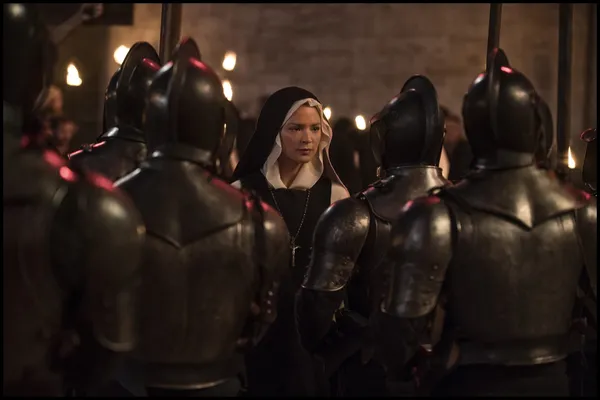Eye For Film >> Movies >> Benedetta (2021) Film Review
Benedetta
Reviewed by: Jennie Kermode

From Ken Russell’s erotic classic The Devils to Guillaume Nicloux’s The Nun, Norifumi Suzuki’s animé take School Of The Holy Beast and Elizabeth E Shuch’s genre-subverting The Book Of Birdie, nuns and lesbianism go together like blockbusters and merchandising in the cinematic imagination. It seems only natural that the subgenre would appeal to Paul Verhoeven, and still more so that he would choose a Renaisance era story, bringing several of his interests together. Benedetta is much more than just an exploitation movie, though – and not just because of the beauty and technical finesse that the Dutch director brings to it. Gerard Soeteman, who contributed to the script, may have left the film (and had his name taken off it) because he felt it was too sexual in its focus, but it is ultimately far more interested in power, society and the sacred.
As Benedetta (Virginie Efira) explains, there are only two ways a woman can have any kind of independence outside the convent in this era: she can be a sex worker or she can be a thief. Otherwise, one way or another, she will be the property of a man, which places her at high risk of sexual exploitation. Benedetta is sharp, even as a child, and we wonder how long she has understood this. She gets a dramatic lesson in it when her family is visiting the convent, when a ragged young woman called Bartolomea (Daphne Patakia) runs into the courtyard, begging for the chance to join the order and escape her abusive father. Shrewd abbess Felicita (Charlotte Rampling in one of the best performances of her career) points out that they were not a charity, and Benedetta beseeches her father to pay Bartolomea’s dowry. It’s the second time we see her wield power over others by insisting that she knows the will of Jesus. It’s a fateful choice, because she and Bartolomea will become lovers.
From the moment you see Benedetta’s conveniently shaped wooden statuette of the Virgin Mary, you will know what’s on the way, but she takes some time to reconcile with her desires. She is, after all, a bride of Christ, in an era when that was often taken literally. As such, she experience the sort of passionate relationship with Jesus written about in the likes of the Ancrene Wisse, with dreams and waking visions verging from rescue fantasies to explicitly erotic encounters. This seems to have been fairly common in the period, but the other nuns are concerned about what may be a symptom of illness. Only gradually do they come to believe that she may be possessed of real mystical powers. By the time she is exhibiting physical symptoms associated with the miraculous, however, it is difficult for anyone to successfully cast doubt on their veracity.
Is Benedetta mad? Is she some kind of saint? Is she simply a savvy opportunist? These questions are never entirely put to rest, and she points out herself that one such possibility would not preclude others. Early on, she attracts the interest of individuals who see political advantage in supporting her claims. With the Inquisition active during this period she is – intentionally or otherwise – playing a very dangerous game, but Verhoeven constructs his film so as to try and cast light on ways of thinking very different from what we are used to today. If Benedetta sees herself as God’s instrument, it may not be a simple thing for her to distinguish between His will and her own. Acts that appear to be selfish in nature may well have positive consequences for others. She is paralleled with Felicita, who may not even believe in God, but who uses the concept of Him to protect and empower the women around her.
Curiously, though the sex scenes between Benedetta and Bartolomea avoid the inadvertent hilarity of Blue Is The Warmest Colour, they once again suggest a male director who doesn’t quite understand how women’s bodies work. The nuns’ naivety and limited repertoire is understandable in the circumstances, their focus on penetration important to the story (albeit ahistorical), but even if all they have are dreams for a reference point, those ten second orgasms are going to disappoint. Given Verhoeven’s past, one might have expected him to be a little more astute. Nevertheless, this works adequately at a character level, echoing Benedetta’s rather peremptory attitude towards any kind of intimacy. She talks a good line about love but, despite the contrary allegations she will go on to face, seems rather more invested in the abstract and general than in the specific. Bartolomea begins as a seducer but quickly emerges as a vulnerable character whose much more limited understanding of the world makes her the obvious target for those who object to her lover’s growing influence.
The whole thing is played out against the background of the Plague, which was ravaging the Italian countryside at the time, and this is where the film becomes really interesting. Benedetta claims that Christ has told her the city of Pescia will be spared, which instantly boosts her status with its desperate people. This, in turn, gives her the power to instruct its guards, introducing a key public health initiative. One might argue that this is a clear example of her faking spiritual insight in order to take an action whose success is based on practical, scholarly knowledge – yet because she is a woman, this is the only way she can get her understanding taken seriously. Is God using her or is she using Him? Their aims seem to aligned. The Church authorities, however, are concerned about the potential cost of a woman being seen to succeed where they have not – and, with that in mind, their aims are rather different.
Many specific incidents here are taken from the life of the real Benedetta Carlini, with Verhoeven making a valiant effort to present her more unusual visions in a way that modern viewers will understand. The interplay of the spiritual and the sensual is vital here, not just where sex is concerned but with regard to bodies generally, whether scourged, scalded, tormented by flame or disease, or washed, anointed, cared for. Patakia is lean and hungry, with a physicality which seems to reflect her animalistic past; she seems perpetually on the brik of rejected the civilised values with which she has been indoctrinated. Efira is slim yet tall and robust. She has a very deliberate stride, looks straight ahead and squares her shoulders, displaying a self assurance not expected of women. in desperate moments, she speaks in a masculine voice taken to be that of Jesus. Yet when she is in the throes of her visions she seems unable to control her body at all, presenting a contradiction which makes her all the more difficult to classify, constrain and control.
Though some will doubtless perceive this film as nothing more than handsomely produced pornography, it addresses issues around gender in ways which remain pertinent today, and serves as a reminder that there have always been women who found ways to work around ingrained social disadvantage. The exquisite lighting directly relates it to early Baroque paintings, and it’s worth remembering that it’s always in the details of such works that their real meaning is found. Whilst many of the scenes may seem to contain traditional figures in classic poses, it speaks about institutions and ideas in the here and now, and there’s a thread of sly humour woven through the mystical, the anguish and the joy.
Reviewed on: 07 Dec 2021

















